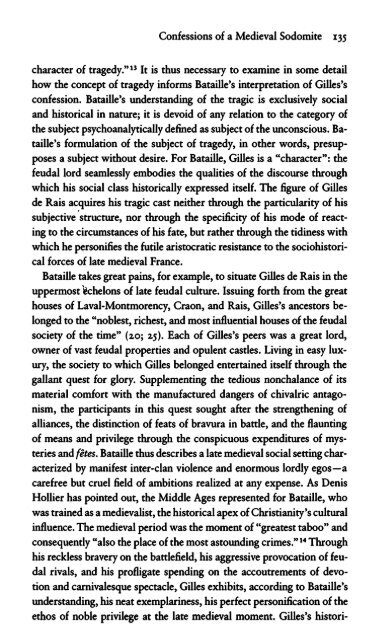Perversion the Social Relation
Perversion the Social Relation
Perversion the Social Relation
- No tags were found...
You also want an ePaper? Increase the reach of your titles
YUMPU automatically turns print PDFs into web optimized ePapers that Google loves.
Confessions of a Medieval Sodomite 135character of tragedy." 13 It is thus necessary to examine in some detailhow <strong>the</strong> concept of tragedy informs Bataille's interpretation of Gilles'sconfession. Bataille's understanding of <strong>the</strong> tragic is exclusively socialand historical in nature; it is devoid of any relation to <strong>the</strong> category of<strong>the</strong> subject psychoanalytically defined as subject of <strong>the</strong> unconscious. Bataille'sformulation of <strong>the</strong> subject of tragedy, in o<strong>the</strong>r words, presupposesa subject without desire. For Bataille, Gilles is a "character": <strong>the</strong>feudal lord seamlessly embodies <strong>the</strong> qualities of <strong>the</strong> discourse throughwhich his social class historically expressed itself. The figure of Gillesde Rais acquires his tragic cast nei<strong>the</strong>r through <strong>the</strong> particularity of hissubjective structure, nor through <strong>the</strong> specificity of his mode of reactingto <strong>the</strong> circumstances of his fate, but ra<strong>the</strong>r through <strong>the</strong> tidiness withwhich he personifies <strong>the</strong> futile aristocratic resistance to <strong>the</strong> sociohistoricalforces of late medieval France.Bataille takes great pains, for example, to situate Gilles de Rais in <strong>the</strong>uppermost "echelons of late feudal culture. Issuing forth from <strong>the</strong> greathouses of Laval-Montmorency, Craon, and Rais, Giles's ancestors belongedto <strong>the</strong> "noblest, richest, and most influential houses of <strong>the</strong> feudalsociety of <strong>the</strong> time" (20; 25). Each of Gilles's peers was a great lord,owner of vast feudal properties and opulent castles. Living in easy luxury,<strong>the</strong> society to which Gilles belonged entertained itself through <strong>the</strong>gallant quest for glory. Supplementing <strong>the</strong> tedious nonchalance of itsmaterial comfort with <strong>the</strong> manufactured dangers of chivalric antagonism,<strong>the</strong> participants in this quest sought after <strong>the</strong> streng<strong>the</strong>ning ofalliances, <strong>the</strong> distinction of feats of bravura in battle, and <strong>the</strong> flauntingof means and privilege through <strong>the</strong> conspicuous expenditures of mysteriesand fêtes. Bataille thus describes a late medieval social setting characterizedby manifest inter-clan violence and enormous lordly egos—acarefree but cruel field of ambitions realized at any expense. As DenisHollier has pointed out, <strong>the</strong> Middle Ages represented for Bataille, whowas trained as a medievalist, <strong>the</strong> historical apex of Christianity's culturalinfluence. The medieval period was <strong>the</strong> moment of "greatest taboo" andconsequently "also <strong>the</strong> place of <strong>the</strong> most astounding crimes." u Throughhis reckless bravery on <strong>the</strong> battlefield, his aggressive provocation of feudalrivals, and his profligate spending on <strong>the</strong> accoutrements of devotionand camivalesque spectacle, Gilles exhibits, according to Bataille'sunderstanding, his neat exemplariness, his perfect personification of <strong>the</strong>ethos of noble privilege at <strong>the</strong> late medieval moment. Gilles's histori-








